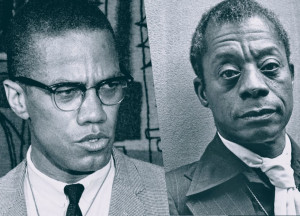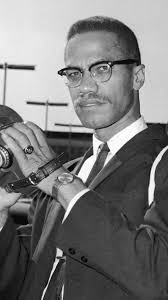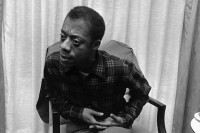


-from OpenCulture.com
One often hears lamented the lack of public intellectuals in America today. Very often, the lamenters look back to James Baldwin, who in the 1950s and 1960s wrote such powerful race-, class-, and sex-examining books as Go Tell It on the Mountain, Giovanni's Room, and The Fire Next Time, as one of the greatest figures in the field. Though Baldwin expatriated himself to France for much of his life, he seems never to have let the state of his homeland drift far from his mind, and his opinions on it continued to put a charge into the grand American debate.
Upon one return from Paris in 1957, Baldwin found himself wrapped up in the controversy around the Civil Rights Act and the related movements across the south. He wrote several high-profile essays on the subject, even ending up himself the subject of a 1963 Time magazine cover story on his views. That same year, he went on a lecture tour on race in America which put him in close contact with a variety of student movements and other protests, whose efficacy he and Malcolm X debated.
"While Malcolm X criticized the sit-in movement as passive," writes Rhonda Y. Williams in Concrete Demands: The Search for Black Power in the 20th Century, "Baldwin argued that 'maintaining calm in the face of vitriol demands a tremendous amount of power.'" He goes on to say that "when the sit-in movement started or when a great many things started in the western world, I think it had a great deal less to do with equality than with power." This got him wondering about what he saw as the all-important distinction between "power and equality" and "power and freedom."
Two years later, Baldwin appeared in another high-profile debate with about as different an interlocutor from Malcolm X as one can imagine: Firing Line host William F. Buckley, across from whom every well-spoken public intellectual in America of that era must have sat at one time or another. They discussed whether the American Dream comes "at the expense of the American negro." Buckley, as Josh Jones wrote here in 2012, "had come out four years earlier against desegregation and Civil Rights legislation" and could ably defend his positions, but "Baldwin proved the more persuasive voice."
Dissecting the skills of Baldwin the debater, John Warner of Inside Higher Education writes that"Baldwin’s remarks display all the skill and moves of an expert persuader" such as "the attendance to audience, the acknowledgement of their needs, the combination of both emotional and logical argument." His arguments also have their roots not in "attitudes or beliefs, which are varied and changeable, but values, which are widely shared and immutable."
Baldwin, Warner continues, "reminds us that America is the land of the free, the home of the brave, that all men are created equal, that we are here to pursue life, liberty, happiness," but "while these values are powerful and timeless, our understanding of how they may be best achieved, the conditions under which they can be fostered change all the time." Whether on the air or in text, against Malcolm X, William F. Buckley, or anyone else, his performance in debate shows that "the best and most lasting persuasion is simply the act of reminding people of what they already believe to be true."
Related Content:
James Baldwin Bests William F. Buckley in 1965 Debate at Cambridge University
James Baldwin: Witty, Fiery in Berkeley, 1979
Malcolm X, Debating at Oxford, Quotes Shakespeare’s Hamlet (1964)
- KBOO


